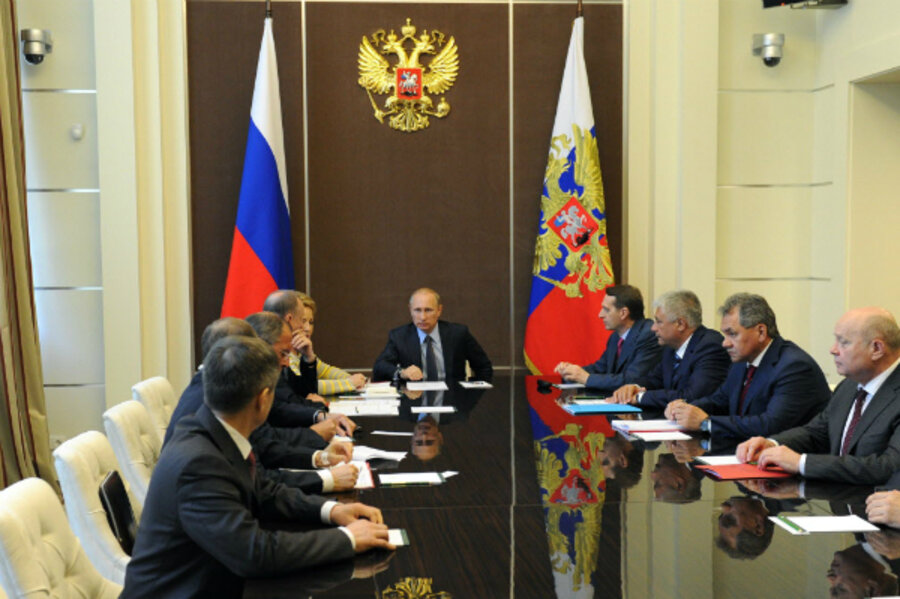Putin orders pullback of troops from Ukraine border, Pentagon skeptical
Loading...
| WASHINGTON
Tensions in Ukraine moved down another notch Monday as Russian President Vladimir Putin announced – once again to Western skepticism – a pullback of Russian troops from the Ukrainian border.
A Russian pullback would signal Mr. Putin’s satisfaction with the general direction of the Ukrainian crisis, regional experts say – and with how the large Russian military presence was able to influence events to Russia’s liking without an incursion or even a shot being fired.
The lower tensions raise hopes that Sunday’s crucial national elections in Ukraine will proceed across the country with a solid turnout and result in a new leadership with enhanced legitimacy internally and internationally, analysts add.
But the calmed atmosphere and softer signals from Moscow are also likely to mean that the tougher sanctions some in Washington want to impose on Russia are even a longer shot than had seemed to be the case a week ago.
Russia pulling back its troops now “is a very important signal for Ukrainians,” says Balázs Jarábik, a visiting scholar on Ukraine at the Carnegie Endowment for International Peace in Washington. “It’s making the elections legitimate.”
The Kremlin’s announcement that it is ordering units deployed to three regions of western Russia back to their bases was dismissed by NATO and the Pentagon.
“Now I think it’s the third Putin statement on withdrawal of Russian troops but, so far, we haven’t seen any withdrawal at all,” said NATO Secretary General Anders Fogh Rasmussen. The Pentagon echoed those words, while White House spokesman Jay Carney said the US would know from satellite images if large numbers of the 40,000 Russian troops deployed along the border were withdrawing.
But no matter what the Russian troops are doing, Putin is signaling that the threat of a Russian invasion – something many analysts say the Russian leader always intended to avoid anyway – is subsiding, Mr. Jarábik says.
That means, he adds, that Putin believes the deployment of troops did its job by helping achieve a number of Russia's goals, which run from the election of a leadership in Kiev that Moscow can work with to a weakened (though not completely destabilized) and less fervently pro-Western Ukraine that will continue to face a restive east and is unlikely to push for membership in either the European Union or NATO.
On the question of the leadership likely to come out of Sunday’s election, Jarábik notes that the Maidan revolution forces (responsible for the ouster in February of former pro-Russia president Viktor Yanukovych) are barely registering in pre-election polls.
“We’re back to where we started – with the oligarchs,” he says, noting that the front-runner, Petro Poroshenko – known as the “Chocolate King” because of his candy empire – has holdings in Russia. That, plus the fact that Mr. Poroshenko was economics minister under former President Yanukovych and says he would oppose a referendum on Ukraine joining NATO, may have persuaded Putin to give working with him a shot.
Yet even if the elections go off well and Ukraine elects a president – either outright on Sunday or in a runoff vote in June – Ukraine is not out of the woods, other regional experts say. Most expect Ukraine to remain indefinitely the center knot in a Russia-West tug-of-war.
“The goal of Russia’s policy … has not changed – making sure Ukraine is a neutral ground in strategic terms,” says Dmitri Trenin, director of the Carnegie Moscow Center.
That said, Mr. Trenin insists that Ukraine’s direction, which he cautions could still turn downhill to deeper civil conflict, won't be determined primarily by outside forces but rather by events within the country.
Tensions remain in the east, where the Kiev authorities continue to carry out operations against separatists whom they consider to be “terrorists” and where skirmishes occurred over the weekend. Separatists are vowing to disrupt voting in the east in Sunday’s elections, even as polls suggest that a strong majority of eastern Ukrainians intend to vote.
“This crisis is not so much about Russia, it’s very much about the developments within Ukraine that will push it in one direction or another,” Trenin says. The “potential’ is still very much there “for stumbling into a civil war.”








